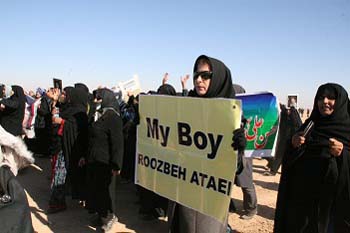The most unhelpful aspect of the negotiations to close Camp Ashraf and remove the residents from Iraq is that the Western agents continue to act on the myth that the people inside the camp  are somehow a single, discrete entity with no connection to the outside world and no say in their own treatment. Thus it is reported without context, analysis or explanation that the Mojahedin-e Khalq will need to be transferred to a separate facility – specifically the former U.S. military base Camp Liberty. Once there they will need to be interviewed by the UNHCR for decisions to be made on their refugee status, with UNAMI overseeing Iraqi conduct at the new camp. And out of this process their futures will be determined.
are somehow a single, discrete entity with no connection to the outside world and no say in their own treatment. Thus it is reported without context, analysis or explanation that the Mojahedin-e Khalq will need to be transferred to a separate facility – specifically the former U.S. military base Camp Liberty. Once there they will need to be interviewed by the UNHCR for decisions to be made on their refugee status, with UNAMI overseeing Iraqi conduct at the new camp. And out of this process their futures will be determined.
But even this, ‘the desired outcome’, is being promoted without the actual cooperation of the MEK leader.
This proposed mass movement of the camp’s residents can only give rise to a pseudo angst-ridden hand-wringing which at one time fears mass suicide, at another their mass deportation to Iran where they will be tortured and executed, it fears they are labelled as terrorists and will not be ‘allowed’ to come to the West, and then fears that they will come to the West and pose a security threat. Underpinning the whole Washington-led negotiation process is the basic principle ‘how do we conserve the MEK’.
Behind the naive and unhelpful scenario of convincing Massoud Rajavi to agree the mass relocation of his captives to an open camp over which he has no control lies a blatant violation of fundamental human rights which is taking place before everybody’s eyes but which nobody apparently wants to acknowledge. This is because focusing on this situation would remove any legitimacy from the negotiations. It would expose the reality behind the myth; Massoud Rajavi is nobody’s representative. It would mean acknowledging that Rajavi has falsely imprisoned over three thousand individuals and is daily violating their basic human rights and it would mean moving forward on that basis.
There are currently around 400 families at the gates of the camp. They have come determined to rescue their loved ones and protect them from harm. These are the true representatives of their captured relatives in the camp. Why do they still have no voice? Why do international agencies ignore them and pretend they have no stake in the negotiations and outcome.
Over the past eight years family after family has tried to assert their basic right – to meet with their closest relatives in a secure and private atmosphere outside the control of the MEK. The demand pre-dates the decision to close Camp Ashraf, and will certainly post-date any moves at the camp. Indeed, the biggest scandal is that this demand has nothing to do with the Iraqi determination to close the camp before the end of 2011, but it is still being ignored.
While nobody expected the MEK leaders to welcome the families with open arms, and nobody expected the MEK’s callous and cynical owners to care for the individual welfare of their gladiators and slaves, it is shocking that even internationally renowned human rights organisations like Amnesty International, Human Rights Watch and the UNHRC have not uttered a word about this situation. These protectors of human rights may as well have been paid by the Rajavis for their spurious appeals to the Iraqis to ‘protect the human rights’ the camp’s residents. Not one single word of criticism has been said against the Rajavi’s blatant and cruel denials of these families’ just demands. Not one word of criticism has been levelled against the Rajavis’ daily abuse of human rights inside the camp in spite of the on-going testimonies of both past and recent escapees.
It is the urgent obligation of every humanitarian agency involved to prefix the mythical negotiations with the unequivocal demand that Rajavi immediately and peacefully open the gate of Camp Ashraf and allow the people inside to have contact with their families. There can be no legal or moral obstacle or objection to such a course of action.
Anne Singleton is the author of the books "Saddam’s Private Army" and "Camp Ashraf"

